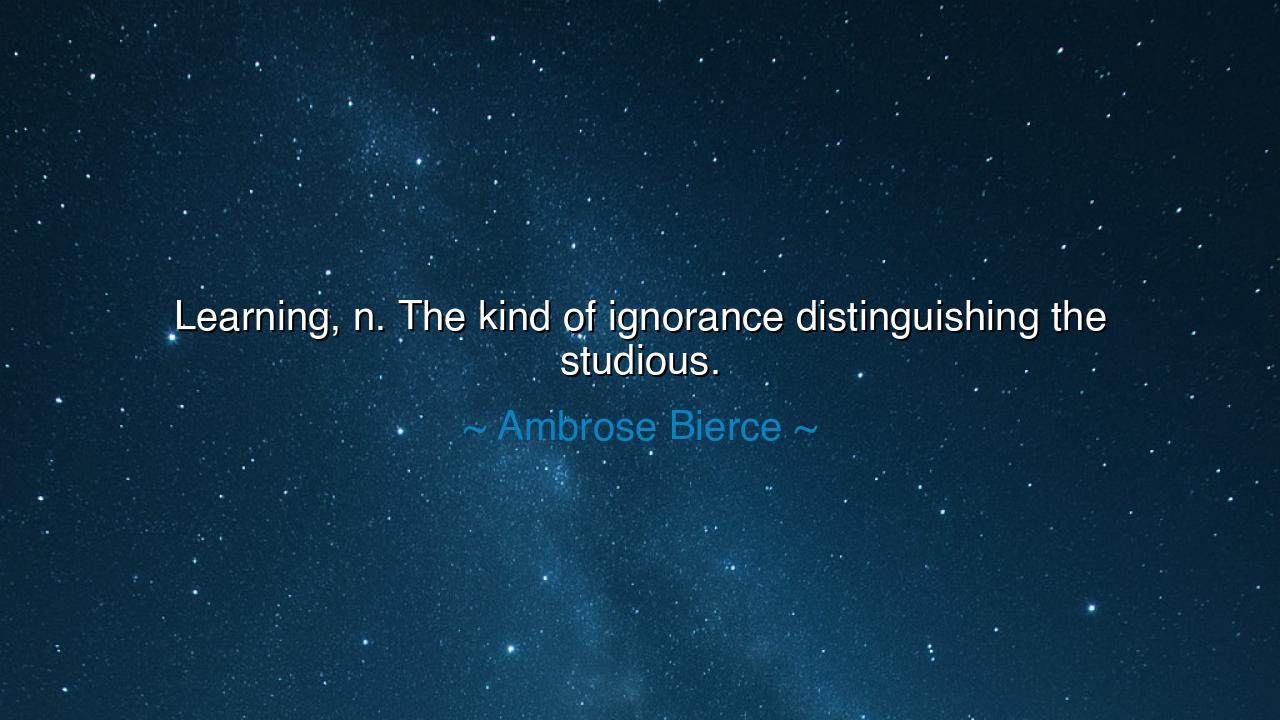
Learning, n. The kind of ignorance distinguishing the studious.






In the sharp and paradoxical words of Ambrose Bierce, the American master of wit and cynicism, we encounter a truth wrapped in irony: “Learning, n. The kind of ignorance distinguishing the studious.” At first, his words seem to mock the very idea of education — to call learning a form of ignorance feels like an insult to the pursuit of knowledge itself. Yet, beneath this sardonic veil lies a profound and ancient insight: that the more one learns, the more one becomes aware of the vastness of what remains unknown. In this sense, Bierce does not ridicule learning — he reveres it, for it humbles those who truly practice it.
To understand the origin of this quote, we must look to its author and his masterpiece, The Devil’s Dictionary, first published in 1906. Bierce was a soldier, a journalist, and a man disillusioned by war, hypocrisy, and the pretensions of intellect. Through his dictionary of satirical definitions, he sought to strip away the masks that society and philosophy wear, revealing the raw truth beneath. When he defined learning as “the kind of ignorance distinguishing the studious,” he was not scorning scholars but warning them: beware of believing that knowledge makes you wise. True wisdom begins only when you recognize that learning is not an escape from ignorance, but an introduction to it.
This idea echoes through the ages. Long before Bierce, Socrates, the ancient sage of Athens, declared, “I know that I know nothing.” His words, like Bierce’s, were not an admission of stupidity but a celebration of humility. The philosopher, who devoted his life to questioning others, knew that every answer uncovered new questions. Knowledge is infinite, but the mind of man is not — thus, the wise are forever students. The ignorance of the studious, as Bierce calls it, is not the blindness of the unthinking, but the open-eyed awareness that human understanding is always incomplete.
In this sense, learning becomes both a blessing and a burden. The ignorant rest content in their certainty, but the learned are restless, aware that each revelation leads only to deeper mysteries. Consider Isaac Newton, who, after unveiling the laws of gravity and motion, compared himself to a child collecting shells on the shore, while the great ocean of truth lay undiscovered before him. This humility — this awe before the infinite — is precisely what distinguishes the studious. They are those who have peered into the abyss of knowledge and, instead of arrogance, have found wonder.
Yet Bierce, ever the satirist, also meant to remind us of the folly of pretension. For there are those who mistake information for wisdom, who wear learning as a crown rather than a compass. The “studious,” he suggests, are not immune to vanity — and their ignorance, though refined, can still lead to blindness if they forget its nature. A mind that fills itself with facts but never questions its own limits becomes imprisoned by its pride. Bierce’s irony serves as a mirror, reflecting both the nobility and the absurdity of intellectual ambition.
We may also find this lesson written in the story of Galileo Galilei, the astronomer who dared to challenge the dogmas of his age. Through his telescope, he saw the moons of Jupiter and the movements of the stars — wonders that defied the accepted wisdom of his time. Yet for his discoveries, he was condemned by those who believed themselves already in possession of truth. The tragedy of his persecution shows both the ignorance of the learned and the wisdom of humility: that knowledge without openness becomes tyranny, and curiosity without reverence becomes arrogance.
The lesson, then, is clear and enduring: let your learning make you humble, not proud. Seek knowledge not to feel superior, but to feel more deeply connected to the mystery of existence. Remember that every book read, every fact mastered, and every discovery made should lead not to self-congratulation, but to wonder. Be like the ancient seekers, who knew that wisdom is not in the answers, but in the endless asking of questions. Ignorance, when recognized, becomes the soil from which true understanding grows.
So, my listener, take to heart the wisdom hidden in Ambrose Bierce’s jest. Learn deeply, but never believe that you have learned all. The world will always be larger than your understanding, and that is its glory. Let your mind be vast, your curiosity unending, and your humility steadfast. For in the end, the highest form of learning is not to escape ignorance, but to dwell within it gracefully — to know that knowledge is but a candle, flickering against the eternal darkness, and yet to keep it burning, ever brighter, for those who come after you.






AAdministratorAdministrator
Welcome, honored guests. Please leave a comment, we will respond soon